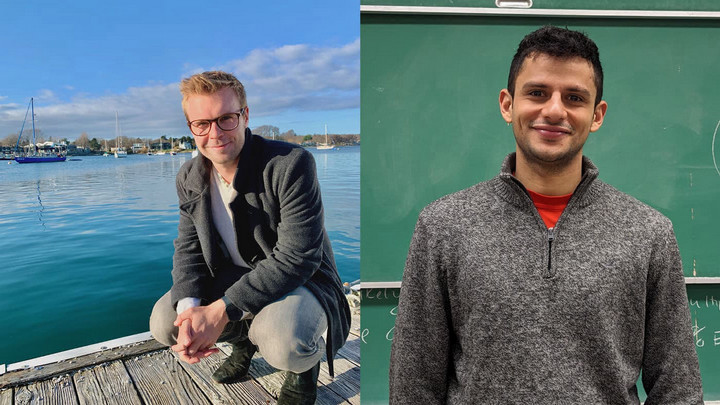The 3-Minute Thesis
April 10, 2024

Distill years of research and an 80,000-word thesis into a three-minute presentation? The 3MT®, created by the University of Queensland in 2008, is just one more way that graduate students can challenge themselves.
At UVic, twenty-three Master’s and PhD students persevered through the drafting, revising, coaching, practices and semi-finals this year. On March 15, eight finalists took to the stage in David Lam Auditorium. Two of them tell us why they wanted to do this and what they learned.
PhD student in Physics and Astronomy Maheyer Shroff’s pool-table metaphor for particle physics took top honours and he’ll be heading to the Western Regional Competition at UBC’s Okanagan campus in May.
VPRI: Why did you decide to tackle the 3MT?
Maheyer (pictured right): I always thought it was interesting to be able to condense an entire thesis into 3 minutes,” Shroff says. “I took part in the competition to challenge myself to see whether I could come up with ways to explain technical topics using everyday life scenarios for a general audience. I am also used to rambling a lot, so I wanted to challenge myself to be succinct and explain concepts within under 3 minutes!
VPRI: Was it worth it? What did you gain?
Maheyer: I found that 3MT is more than improving your public speaking. In particular, I learned a lot about graphics within communications and how to have a flow of images that would hopefully convey a thousand words.
I also learned about some really cool research work that my other 3MT colleagues are doing!
The runner-up is Talen Rimmer of Biology, who described how he adapted AI to count different species of animals in a kelp bed.
VPRI: Why did you decide to tackle the 3MT?
Talen (pictured left): To be honest I've been looking forward to this competition for most of my degree. I think that to compete in this contest – to thoughtfully spend time converting years of research (and really, life) into an accessible story, and then deliver that story to people who support and care about what you do – is a privilege I hope all grad students get to experience.
VPRI: Was it worth it? What did you gain?
Competing in 3MT not only let me learn about the breadth of amazing graduate student research on campus, but sparked conversations with my project's collaborators that gave me new insights into how I can better contextualize and communicate my thesis.
We're hopeful that this technology will be applied to a variety of projects in the future, both relating to seaweed farms but also for underwater monitoring more broadly. For example, a collaboration between the Tsawout Nation and Cascadia Seaweed will be applying this method to help monitor a recently established Indigenous Protected and Conserved Area in the Salish Sea. Findings related to this project and its applications will likely be published later this year, so stay tuned!
“I continue to be amazed by the quality of all of the presentations,” says Robin Hicks, dean of the Faculty of Graduate Studies, which organizes the annual event. “The students were engaging and informative. We learned a lot about the important research that students are doing across UVic.”
